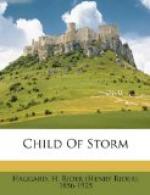A roar of delight rose from the watching Amawombe, while old Maputa clapped his thin brown hands and grinned from ear to ear.
“Thank you, Macumazahn. A very good omen! Now I am sure that, whatever those Isigqosa dogs of Umbelazi’s may do, we King’s men shall make an excellent end, which is all that we can hope. Oh, what a beautiful shot! It will be something to think of when I am an idhlozi, a spirit-snake, crawling about my own kraal. Farewell, Macumazahn,” and he took my hand and pressed it. “The time has come. I go to lead the charge. The Amawombe have orders to defend you to the last, for I wish you to see the finish of this fight. Farewell.”
Then off he hurried, followed by his orderlies and staff-officers.
I never saw him again alive, though I think that once in after years I did meet his idhlozi in his kraal under strange circumstances. But that has nothing to do with this history.
As for me, having reloaded, I mounted my horse again, being afraid lest, if I went on shooting, I should miss and spoil my reputation. Besides, what was the use of killing more men unless I was obliged? There were plenty ready to do that.
Another minute, and the regiment in front of us began to move, while the other two behind it ostentatiously sat themselves down in their ranks, to show that they did not mean to spoil sport. The fight was to begin with a duel between about six thousand men.
“Good!” muttered the warrior who was nearest me. “They are in our bag.”
“Aye,” answered another, “those little boys” (used as a term of contempt) “are going to learn their last lesson.”
For a few seconds there was silence, while the long ranks leant forward between the hedges of lean and cruel spears. A whisper went down the line; it sounded like the noise of wind among trees, and was the signal to prepare. Next a far-off voice shouted some word, which was repeated again and again by other voices before and behind me. I became aware that we were moving, quite slowly at first, then more quickly. Being lifted above the ranks upon my horse I could see the whole advance, and the general aspect of it was that of a triple black wave, each wave crowned with foam—the white plumes and shields of the Amawombe were the foam—and alive with sparkles of light—their broad spears were the light.
We were charging now—and oh! the awful and glorious excitement of that charge! Oh, the rush of the bending plumes and the dull thudding of eight thousand feet! The Usutu came up the slope to meet us. In silence we went, and in silence they came. We drew near to each other. Now we could see their faces peering over the tops of their mottled shields, and now we could see their fierce and rolling eyes.
Then a roar—a rolling roar such as at that time I had never heard: the thunder of the roar of the meeting shields—and a flash—a swift, simultaneous flash, the flash of the lightning of the stabbing spears. Up went the cry of:




